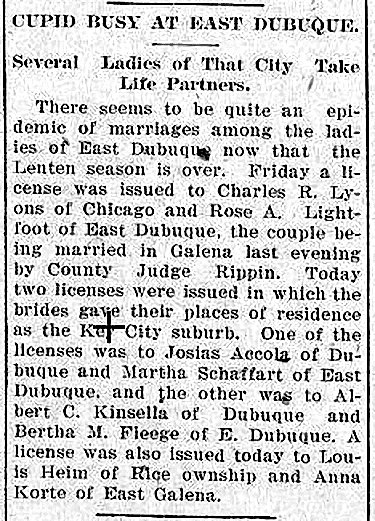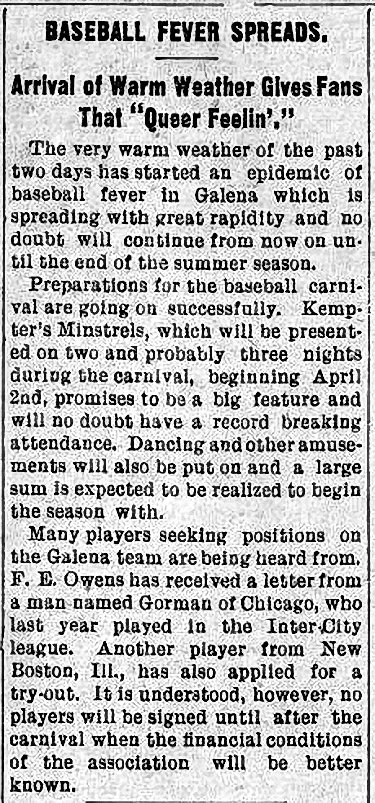A message for our readers
The Galena Gazette is providing all of its news stories and photos of the COVID-19 pandemic with no payment required as a public service and in an effort so you can be totally knowledgeable as to how the pandemic affects you. Please consider a print or online subscription to support this vital reporting by a locally owned business .
Epidemics run rampant in the Gazette
The pages of historic Gazettes are filled with the term epidemic, some that might have been actual epidemics and others where the reporter took luxury in the use of the word, from epidemics of marriages in East Dubuque to a fever for a sport. These “epidemics” tell about life in Galena at the turn of the century.
Epidemics were still a touchy subject and at the front of everyone’s mind at the end of 1890, following an outbreak of the Russian Flu in January and February of that year.
October 1890 saw a typhoid fever epidemic break out in School Section and that there were some deaths but they “have been few in proportion to the number of cases and the length of time the epidemic has reigned.” That is familiar verbiage that one might see today when coronavirus is compared to other illnesses.
An unusual epidemic occurred in December 1891. The Dec. 4, 1891, edition of the Gazette describes a sore throat epidemic that was nothing serious, but was serious enough to shut down the Galena Shoe Factory because it “attacked so many of them.”
The new normal of cancellations was the talk of the town in 1892 at the eve of the World’s Fair in Chicago.
“A visitation by cholera is to be dreaded at all times,” said the Gazette on Sept. 17, 1892. “Its appearance...would be particularly unfortunate in that it would be a great embarrassment to the World’s Fair. Should the disease become epidemic early next year, the fair would undoubtedly be postponed until 1894.”
In 1893, an “epidemic of membranous croup” caused worry in Galena. There were five deaths from the disease within the few weeks with four of them occurring on the city’s east side.
Eye problems were the cause of worry in the Gazette as well as an epidemic of pink eye that plagued Vinegar Hill in March 1895. A dozen years later, another mysterious eye problem caused worry of an upcoming epidemic in 1907, but those fears were unfounded.
Some bizarre epidemics occurred as well during this time period. On Sept. 18, 1897, in Warren, the Galena Gazette claimed that there were an “epidemic of horse kicks” during the previous week. It began the previous Sunday when farmhand Sam Smeck broke his left arm after being kicked by a horse at William Mill’s farm.
The Warren Sentinel also reported on Loran Stowe losing a valuable horse after it was kicked by another horse and broke its leg. The final saga of this epidemic occurred when Mr. Reed of Stockton broke several ribs when he visited his son near Elizabeth after being kicked by a horse he was leading into the stable.
The next epidemic was one that many were hoping for in March of this year.
“The very warm weather of the past two days has started an epidemic of baseball fever in Galena which is spreading with great rapidity and no doubt will continue from now on until the end of the summer season,” reported the March 22, 1907 Galena Daily Gazette.
There were reports in the paper of a baseball carnival that would begin on April 2 and a preview of the upcoming season.
The final epidemic that I wanted to make mention of is one that occurred in the city of East Dubuque and was covered in the April 25, 1908, edition of the Gazette.
The paper reported on an “epidemic of marriages among the ladies of East Dubuque now that Lenten season is over.” The paper reported the marriage of Rose Lightfoot to Charles Lyons, the marriage of Josias Accola and Martha Schaffart and the marriage of Albert Kinsella and Bertha Fleege. The concern apparently was that they were being married to men who weren’t from East Dubuque as Lyons was from Chicago and Accola and Kinsella were from Dubuque, Iowa. Later in the article a marriage between Louis Heim of Rice Township and Anna Korte of East Galena was reported on but luckily Galena wasn’t witnessing a marriage fever.
As epidemics surged across the print of the Galena Gazette, occasionally one would learn about the causes of the fever which includes pencils at school and pharmaceuticals being sold on Main Street. That’s a story for another week.
 Fair, 41.0° F
Fair, 41.0° F




